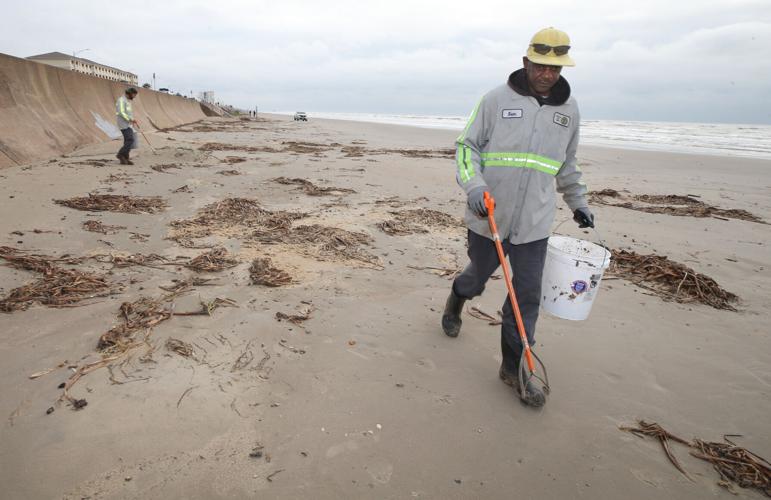Galveston hotel tax negotiations stalled over severance, beach money
Published: Thu, 11/16/23
Galveston hotel tax negotiations stalled over severance, beach money

Sean Kirby, right, and Grant Bello, with the Galveston Island Park Board of Trustee’s Coastal Zone Management Team, clean the beach near 89th Street in Galveston on Tuesday.
JENNIFER REYNOLDS/The Daily News
GALVESTON - Tourism officials Tuesday deferred action on a long-anticipated contract with the city over handling hotel occupancy tax revenue, saying negotiations were at impasse over three points and calling for a meeting with city leaders.
Months of negotiations are hung up on using hotel tax revenue to pay for executive severance packages, worries about altering the budget for beach cleaning and nourishment and whether the park board and city should “true up” hotel tax revenues and expenses quarterly or annually.
The city and park board have for months been hashing out a contract to define the management terms and use of hotel occupancy tax revenue.

Jason Hardcastle
The draft contract forbids the board from using hotel tax revenue to fund severance packages for the CEO and chief financial officer, Park Board of Trustees Chairman Jason Hardcastle said in his motion to defer the action.
The park board has agreed to allow severance agreements approved for some rank-and-file employees when the organization faced a “mass exodus” — caused by the departure of former CEO Kelly DeSchaun — to expire, Hardcastle said.
The board wants to provide severance packages for the CEO and chief financial officer and fund those with hotel tax revenue, however, Hardcastle said.
Severance agreements are standard for CEOs and other executives hired and fired by governing bodies controlled by elected or appointed boards that can be influenced by politics, Hardcastle said in a separate interview.
The limited packages are “modeled after city leadership’s severances, as their employment is similarly directly determined by a board vote,” he said.
The issue seemed intractable Tuesday.
“Staff’s position is that severance pay is not payable from HOT,” City Attorney Don Glywasky said. “We’re not saying they can’t have severance. We’re saying they can’t pay it with HOT. We do not understand how paying a person leaving money puts heads in beds, which is supposedly a test for HOT.”
If the park board wants to pay severance, it can use its administrative funds, city officials say.
Under Texas law, hotel occupancy tax revenue can be used only to directly promote tourism and the convention/hotel industry, meaning the proceeds should be spent on projects or events that result in visitors or attendees staying overnight in the community, generating more hotel occupancy tax.
The park board, which manages beach parks, Beach Patrol and the city’s tourism efforts, is funded through a portion of the island’s hotel occupancy tax revenues, as well as beach parking fees and grants. It also generates revenue through advertising.
Last year, as tourism soared, the hotel occupancy tax generated $30 million, along with conflict about who should control the windfall. About $10 million of that goes to the state and the remainder goes to the park board and to the city.
Revenue from four “pennies” of the city’s 15 percent hotel tax imposed on consumers of hotel and short-term rentals goes to the park board. Revenue from three of those pays for sales and marketing to attract tourists. Revenue from the remaining penny also funds Beach Patrol and beach cleaning.
For years, the park board collected the revenue and kept it in its own accounts. No one took issue with that until October last year, when District 3 Councilman David Collins said the city and board for years had inadvertently violated state laws and the local charter by not keeping the money in city accounts.
Tensions between the city and park board reached apex in May when the board and de Schaun agreed to part ways after 12 years. The park board agreed to pay de Schaun about $240,000 in a severance agreement.
Two weeks later, the park board OK’d a slew of severance agreements for its top executives.
Hardcastle also worries about language in the contract governing revenue from a 0.57 cent slice of the hotel tax rate, which the park board uses for beach nourishment.

Marie Robb
City Councilwoman Marie Robb has questioned the board’s use of that revenue, lamenting a $3.2 million annual payroll for 45 employees.
The city wasn’t trying to take beach-cleaning away from the park board, however, she said.
Hardcastle, however, asserted the city was angling at the beach-cleaning money and the task.
“It is my position the $3 million in labor is a bargain, when you consider the beaches are manually cleaned 365 days per year, without using heavy equipment,” Hardcastle said.
“If the city of Galveston is to alter this park board department’s funding, at a bare minimum, there has to be a plan in place and shared publicly, to maintain the current quality of service that exists for $3 million in labor.
“If the quality of service drops, and Galveston once again has a reputation of unclean beaches, no amount of tourism development investment can overcome that perception.”
Asked Tuesday about negotiations and the beach nourishment contract language, Glywasky said it was the will of the city council, but also that he was leery of negotiating the contract in the newspaper.
The city council is expected to discuss the contract negotiations Thursday in executive session.
Laura Elder: 409-683-5248; laura.elder@galvnews.com